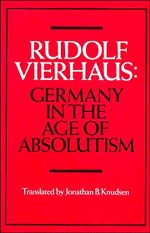3 - Cultural Life
Published online by Cambridge University Press: 05 June 2012
Summary
PRELIMINARY REMARKS: FROM BAROQUE TO ENLIGHTENMENT: ESTRANGEMENT AND INDEPENDENCE
Historical narratives treat simultaneous matters serially, separating die historically indivisible. Cultural life is only a partial aspect of the historical process and is inextricably woven together with economic, social, and political conditions. The real and apparent relations between humankind's material interests and its ideas, those between work, the inner meaning of work, and the stylization of the life cycle, those between power relations and the levels of education – all these are too complex to be explained in terms of a simple model of cause and effect. This is especially true for the realm of culture. Ideas and dominant images can only be understood in connection with the institutions in which people live; the patterns shaping behavior are the result of a lengthy social process of experience and learning. Formative behavior, like the sum of people's works, is the consequence of complex needs, interests, traditions, and images by which they understand their being and task.
The concepts “baroque” and “Enlightenment” are not simply derived from the different areas of art and philosophy, but they also evoke different images. Baroque leads us spontaneously to think of architecture and music, while Enlightenment leads us to philosophy, literature, and pedagogy. In the baroque era, princely residences, the opera, and courtly festivals appeared as forms of princely display, and religious architecture and the celebratory mass seemed the self-representation of an ecclesia triumphans.
- Type
- Chapter
- Information
- Germany in the Age of Absolutism , pp. 58 - 86Publisher: Cambridge University PressPrint publication year: 1989



